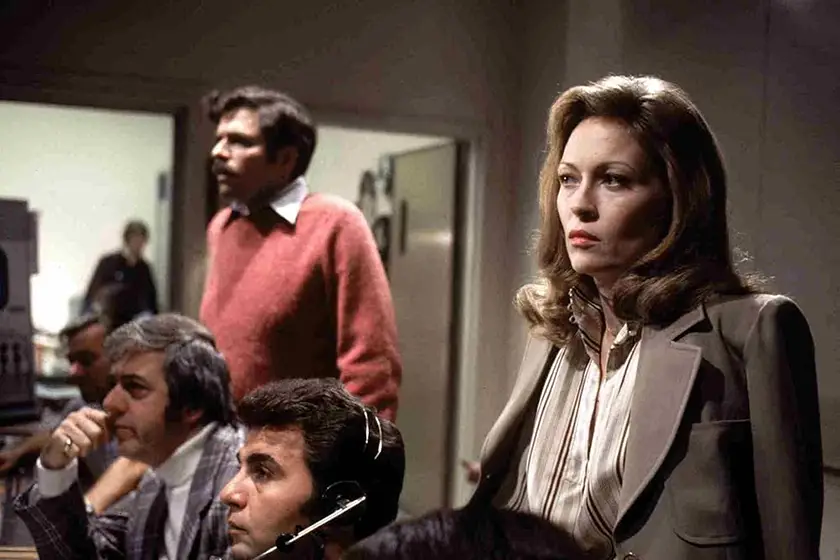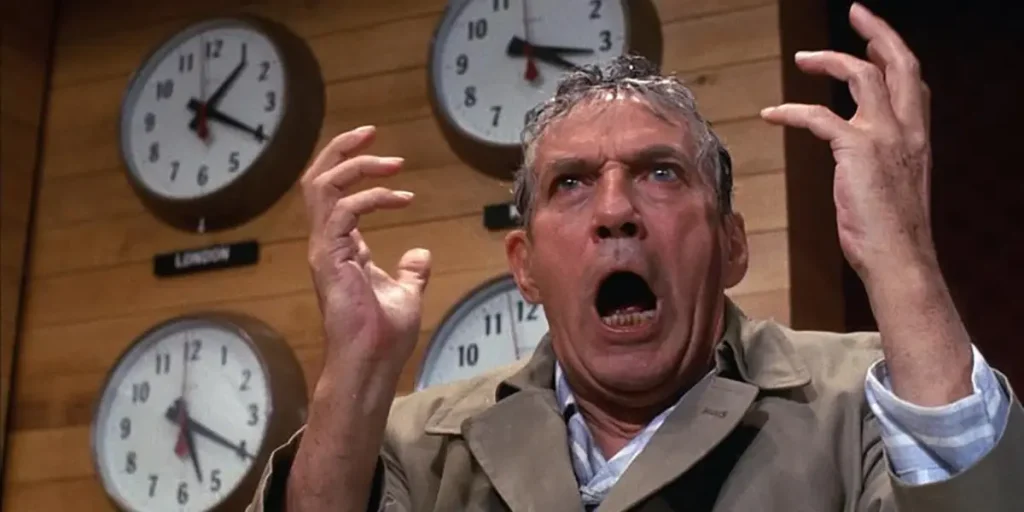Backed by an outstanding cast, Sidney Lumet’s Network (1976) remains an excellent indictment of TV news and corporate power.
Director: Sidney Lumet
Genre: Comedy, Drama, Workplace Drama
Run Time: 121′
Rated: R
U.S. Release: November 27, 1976
U.K. Release: February 20, 1977
Where to Watch: On digital & VOD, and on DVD & Blu-Ray
Sidney Lumet’s Network was a bolt of lightning when it was first released. Written by Paddy Chayefsky (who had already won Academy Awards for Marty and The Hospital), it was an indictment of what news and TV were both becoming, guided by corporate forces and a striving for sensationalism. A biting black comedy with an all-star cast that instantly became a critical smash hit, winning four Academy Awards out of ten nominations. Back in 1976, Network was unlike almost any satire that came before it. Nearly 50 years later, it has remained an excellent and timeless film.
1975, and the world of TV news is extremely competitive. As the narrator (prominent theatre actor Lee Richardson) explains, this story is about the lead anchor for one of the four major networks, UBS. Howard Beale (Peter Finch, Sunday Bloody Sunday) was once a distinguished and venerable newsman. Now his ratings have fallen massively, and he has been fired with two weeks’ notice. Drowning his sorrows with Max Schumacher (William Holden, Sunset Boulevard), president of UBS’ News division and an old friend, Howard drunkenly says he is going to take his own life during a newscast.
When he announces his intentions on the air (and later rants about the state of the world), it causes UBS execs to panic. It also causes audiences to tune in, catching the attention of programming chief Diana Christensen (Faye Dunaway, Bonnie and Clyde). Wanting a successful show, she convinces her boss Frank Hackett (Robert Duvall, The Godfather) to turn the news into entertainment and place Howard’s sweary, messianic outbursts front and centre. It leaves Max displeased, though his feelings become complicated when he begins an extramarital (and tumultuous) affair with Diana.
Network is a dense and lofty film, and that is before it introduces a far-left terrorist army Diana wants to dramatise. Key to the whole thing is the political situation the US found itself in by the mid-1970s, as Watergate, the Vietnam War and a deep recession disenfranchised many. “The American people want somebody to articulate their rage for them”, Diana says – and Howard might just be that somebody. But is his mental breakdown being exploited by UBS? And what happens when Beale exposes the imminent sale of its parent company, CCA, to a Saudi conglomerate?
Either way, he has the means to expose the hypocrisies of our times: television. The impact it has had on us is one of the main focuses of Chayefsky (himself a former TV playwright). As he shows, the golden age of television from the 1950s was well and truly over. And it has been replaced by big conglomerations (like Paramount being owned by Gulf + Western Industries) wielding what Howard calls “the most awesome goddamn force in the whole godless world” and seeking the biggest audiences with flashy, boredom-busting entertainment.
Chayefsky’s script proves to be utterly perfect. There are so many moving parts, as it sometimes shifts from industry-specific vernacular towards achingly realistic relationship dramas between Max, his wife (Beatrice Straight) and Diana, but they slot together effortlessly well. The film is also full of monologues that are wordy and philosophising, yet captivating. Choosing the best is an impossible task. Is it Howard screaming, “I’m as mad as hell and I’m not going to take this anymore!”, now the most remembered part of the film? Or is it the one given by CCA head Mr Jensen, played by a phenomenal Ned Beatty?
“There is no America. There is no democracy. There is only IBM, and ITT, and AT&T, and DuPont, Dow, Union Carbide, and Exxon.” Jensen tells an enraptured Howard, hammering home the point that corporations and capitalist forces are the true Gods in America. Beatty only has this one scene, but he threatens to steal the show, all the while demonstrating that the acting is another wonderful string in Network’s bow. For instance, Beatrice Straight won an Oscar for just five minutes, running the whole gamut of emotions as her character curses her lost marriage to Max.
As for the leads, Peter Finch is commanding in what would be one of his last roles (he died from a heart attack in 1976, being awarded the Best Actor Oscar posthumously). His Howard Beale is partly a newsman going mad after years of unflappability, and partly an extravagant prophet. The scenes from his revamped show seem to predict the performative populism and propaganda later spouted by the presenters of Rupert Murdoch’s Fox News.
William Holden’s weary Max is the closest thing to a moral centre. Faced with betrayals and a restricted news division, he seems to be the only one who sees – or cares about – the exploitation of Beale for ratings. And in a film partly about the clash between older and newer generations in the industry, Max also confronts his age (“All my friends seem to be dying or having grandchildren.”) Meanwhile, Faye Dunaway (winner of the Best Actress Oscar) stands out as the determined and power-hungry Diana, assured yet soulless. Max sums her up best: “I’m not sure she’s capable of any real feelings. She’s television generation. She learned life from Bugs Bunny.”

Even though most of the praise for Network revolves around Chayefsky or the ensemble cast, Lumet does some masterful work here. Here, his naturalist style merges well with the grittiness of New Hollywood and the grittiness of Chayefsky’s material. Not only does he give the performers room to shine, but he also brings a lived-in feel to the UBS environments. He also allows Owen Roizman’s camerawork to become more commercial and stylised as the film progresses. The shots of Howard next to a mock stained glass window would be extraordinary visuals in any film, let alone one as real and searing as Network.
It is still a staggering achievement for all involved with it, perfectly acted by Finch, Dunaway and Holden and engrossing right up to its violent climax. It is a piece of great anger, which can be felt in the thunderous performances and writing. And its anger is fixated on the greed and amorality created by TV trying to chase higher audience shares and revenues. In a way, Network acted as a troubling warning of where we were heading when it came to media, populist messages, commercialism, sensationalism and corporate dominance over all those fields. Perhaps we should have listened.
Network (1976): Movie Plot & Recap
Synopsis:
After being fired, veteran news anchor Howard Beale begins ranting about the state of the world. Noticing an increase in ratings, UBS executives – including programming chief Diana Christiansen – begin to use Beale for their gain.
Pros:
- It’s an excellent indictment of ratings-driven news, TV and corporate dominance that has remained timeless.
- The whole cast is excellent – Peter Finch, Faye Dunaway, William Holden. Even single-scene stars like Ned Beatty and Beatrice Straight threaten to steal the show.
- Paddy Chayefsky’s script is perfect and iconic, especially the monologues.
Cons:
- None whatsoever.
Network (1976) is now available to watch on digital and on demand, and on DVD & Blu-Ray.

